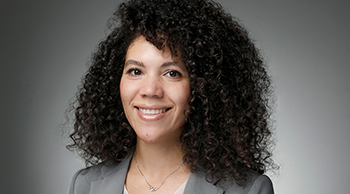
Popular Locations
- Yale New Haven Children's Hospital
- Yale New Haven Hospital - York Street Campus
- Yale New Haven Hospital - Saint Raphael Campus


Sickle cell disease is one of the most common inherited blood disorders in the U.S., yet there is a shortage of physicians who specialize in treating it.
Far fewer physicians treat pregnant people with sickle cell disease (SCD). Yale New Haven hematologist Layla Van Doren, MD, can count the number on one hand, including herself.
And yet, from 2020 - 2023 Yale New Haven Health treated 29 pregnant patients with SCD.
“That might not sound like a lot, but it’s a huge number, especially for a health system this size,” said Dr. Van Doren, assistant professor and director of education, Adult Sickle Cell Program, Internal Medicine, Yale School of Medicine.
An estimated 100,000 Americans have SCD, which affects the hemoglobin in red blood cells. Healthy red blood cells are disc-shaped and flexible, making it easy for them to bring oxygen-carrying hemoglobin throughout the body.
With SCD, red blood cells become hard, sticky and shaped like a crescent (sickle). They can get stuck in smaller blood vessels, blocking blood flow and leading to serious complications such as stroke, organ damage, infections, anemia and episodes of extreme pain. In addition, sickle cells die early, causing a constant shortage of red blood cells and necessitating blood transfusions.
Pregnancy can cause or exacerbate SCD complications, which makes treating these patients extra challenging. Morbidity and mortality rates for the adult and baby are five times higher than for non-pregnant patients with SCD. Preeclampsia – a potentially dangerous type of high blood pressure during pregnancy – occurs in 14 percent of pregnant people with SCD, compared to 4 percent of pregnant people without the disease. Babies are at greater risk for severe anemia, pre-term birth, low birth weight and stillbirth.
One of the biggest challenges in treating pregnant people with SCD is a scarcity of research.
“We’re essentially practicing in a data-free zone,” Dr. Van Doren said. “As a result, there is no treatment, no standard of care for these patients. Providers at different institutions – sometimes within the same institution – are doing different things.”
She aims to change that, by conducting translational research to help create a risk-stratification tool for pregnant patients with SCD. This tool will help physicians determine which patients are at risk of developing complications during pregnancy, when those complications are more likely occur and how to manage them.
Dr. Van Doren hopes research also will lead to proven treatments – whether new or existing. One existing treatment is hydroxyurea, a medication that helps prevent red blood cells from becoming sickle-shaped and keeps them more flexible. Since the 1980s, hydroxyurea has helped reduce pain crises and organ damage in people with SCD, but pregnant patients have been advised to stop or lower their dose of the medication.
Dr. Van Doren questions the research that prompted that recommendation, which was conducted on mice at doses far higher than what a person would take. In reviewing past cases of pregnant people with SCD, researchers have found that normal hydroxyurea doses may not be harmful to the developing baby, but more research in this area is required.
The majority of people with sickle cell disease worldwide are people of color, particularly Black. According to the Centers for Disease Control and Prevention, SCD occurs in about one out of every 365 Black or African-American births and about one out of every 16,300 Hispanic-American births in the U.S. It disproportionately affects other, non-white ethnic groups, also. The shortage of SCD research, providers and treatments, particularly for pregnant people, points to healthcare inequities that mean too many patients aren’t receiving the evidence-based care they need, or aren’t receiving it soon enough, Dr. Van Doren said.
“I’m seeing more pregnant patients with sickle cell disease who have complications, but I’d like to see patients before complications develop,” she said. “That’s the goal for all of us at Yale New Haven’s Sickle Cell Program. We want to provide preventive care versus reactive care.”
Learn more about Yale New Haven Hospital’s Sickle Cell Programs for adults and children.